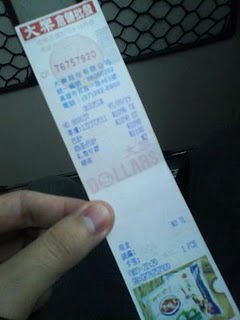Winning Receipts

Government-run lotteries are not uncommon. Pass over a buck or two and you get a ticket, which, if you’re extraordinarily lucky, may be worth thousands if not millions of dollars. The odds are against you, of course, but that’s the point: the lotteries are there to help supplement taxes. After prize payouts, the lottery-licensing government comes away with a pretty penny — according to the North American Association of State and Provincial Lotteries, U.S. and Canadian governments earned over $20 billion in 2010 alone.
But Taiwan has a different lottery, called the Uniform Invoice lottery. It, too, aims to increase the amount of money getting into government coffers. But unlike the traditional lottery, entries into this Taiwanese are free — with the purchase of virtually anything.
Leading up to the 1950s, Taiwan had a tax problem. Sales tax was a large driver of government revenue but retailers could easily avoid it by simply underreporting their income. Consumers did not care — whether the retailer paid the sales tax was immaterial to them. A cash economy further exacerbated the problem, as there was no record created of these grey market sales. After all, when was the last time you insisted on a receipt?
To combat this, Taiwan adopted the Uniform Invoice lottery on January 1, 1951. The rules were simple. Retailers had to give customers receipts (invoices), seen above. Each invoice, by law, included a government-provided lottery number. (The one in the picture above is 76757920.) Consumers were encouraged to ask for and keep these receipts via a special lottery. Every two months, on national television, there’d be a lottery drawing, with the grand prize winner holding the receipt with the lottery numbers which matched the ones drawn. The grand prize, by early 2012, was worth NT$10 million (about $340,000 US) with many smaller prizes also available. (And yes, foreigners can win, too.) For Taiwan, that is a huge amount of money — one person who came one digit away in February mused that he may have been able to retire early had his luck been slightly different.
But the real winner is the Taiwan government. According to Wikipedia, in 1950, the year before the lottery, Taiwan collected NT$29 million in sales tax. In 1951? NT$51 million.
Bonus fact: In Michigan and Nebraska, there is a lottery which you play by not paying — for anything. The lottery, called Save to Win, aims to encourage savings. For every $25 a person deposits per month (up to $250) into a special Save to Win account with a participating credit union, that person receives a certificate which acts like a lottery ticket. There are monthly drawings for various small cash prizes, but at the end of the year, there’s a grand prize — a single $25,000 in Nebraska and one of ten $10,000 prizes in Michigan.
From the Archives: Beating the Odds: How one lottery’s rules made it, accidentally, very lucrative for some math-inclined players.
Related: A book on “the basics of winning lotto/lottery.” Featured here because it’s ridiculous — the only way to win (for most of us — the Archives link notwithstanding) is to not play.
Image via Pinoy Taiwan Guide

Leave a comment